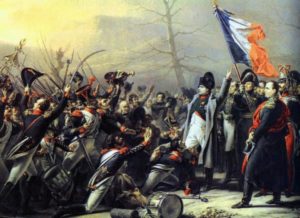by Anthony Watts, August 23, 2018 in WUWT
Napoleon’s defeat at Waterloo caused in part by Indonesian volcanic eruption
Electrically charged volcanic ash short-circuited Earth’s atmosphere in 1815, causing global poor weather and Napoleon’s defeat, says new research.
Historians know that rainy and muddy conditions helped the Allied army defeat the French Emperor Napoleon Bonaparte at the Battle of Waterloo. The June 1815 event changed the course of European history.
Two months prior, a volcano named Mount Tambora erupted on the Indonesian island of Sumbawa, killing 100,000 people and plunging the Earth into a ‘year without a summer’ in 1816.
Now, Dr Matthew Genge from Imperial College London has discovered that electrified volcanic ash from eruptions can ‘short-circuit’ the electrical current of the ionosphere – the upper level of the atmosphere that is responsible for cloud formation.
The findings, published today in Geology, could confirm the suggested link between the eruption and Napoleon’s defeat.
…

